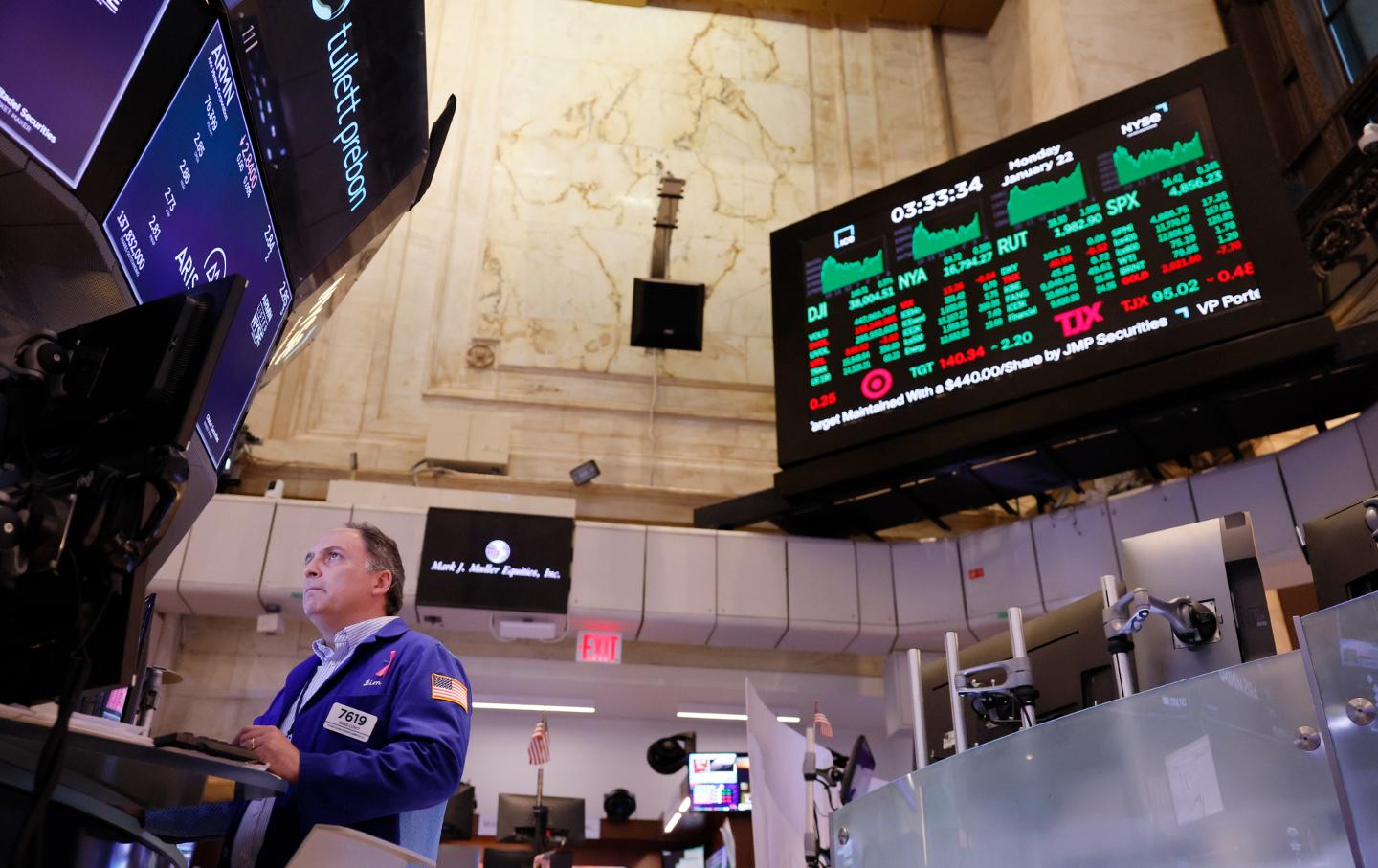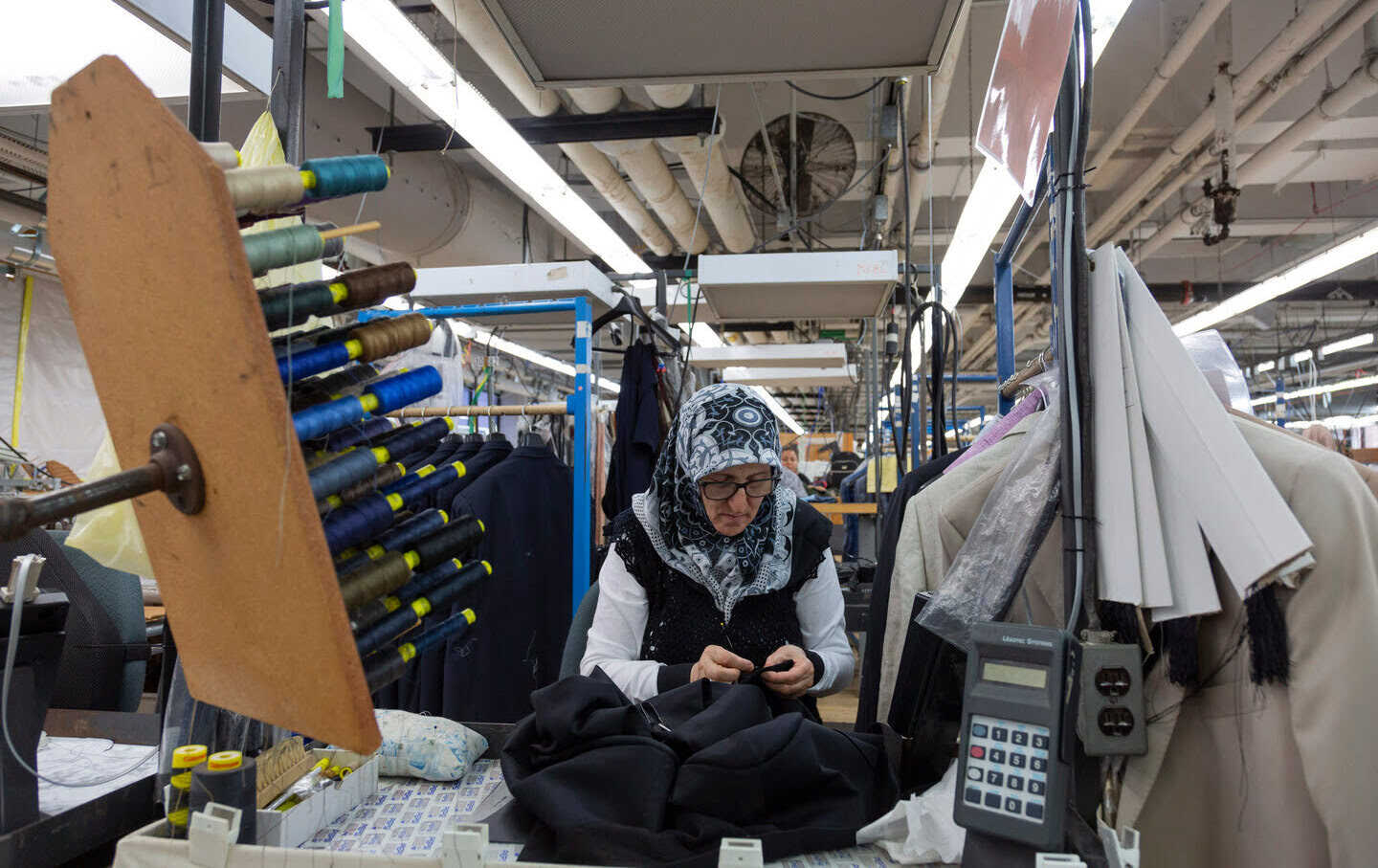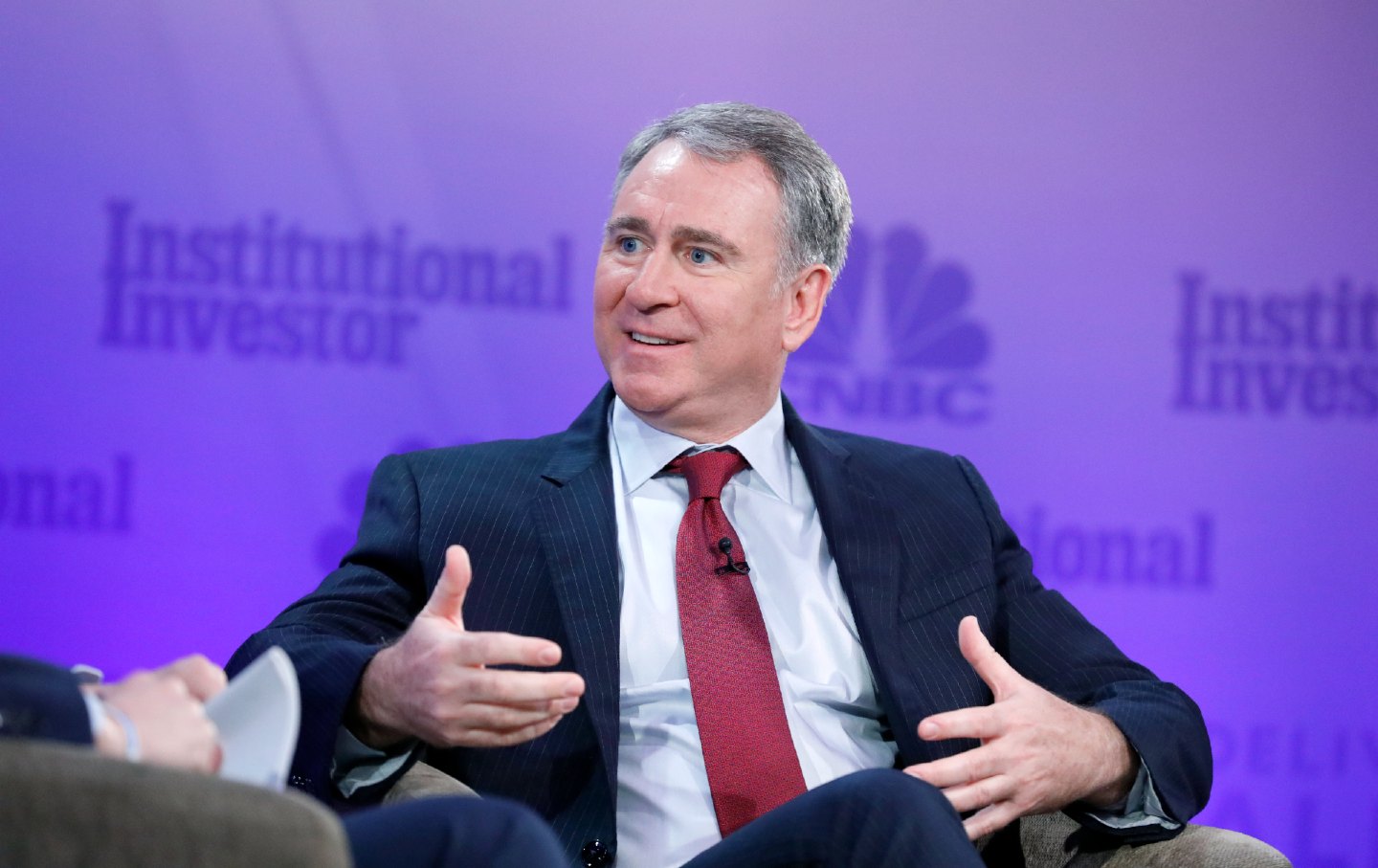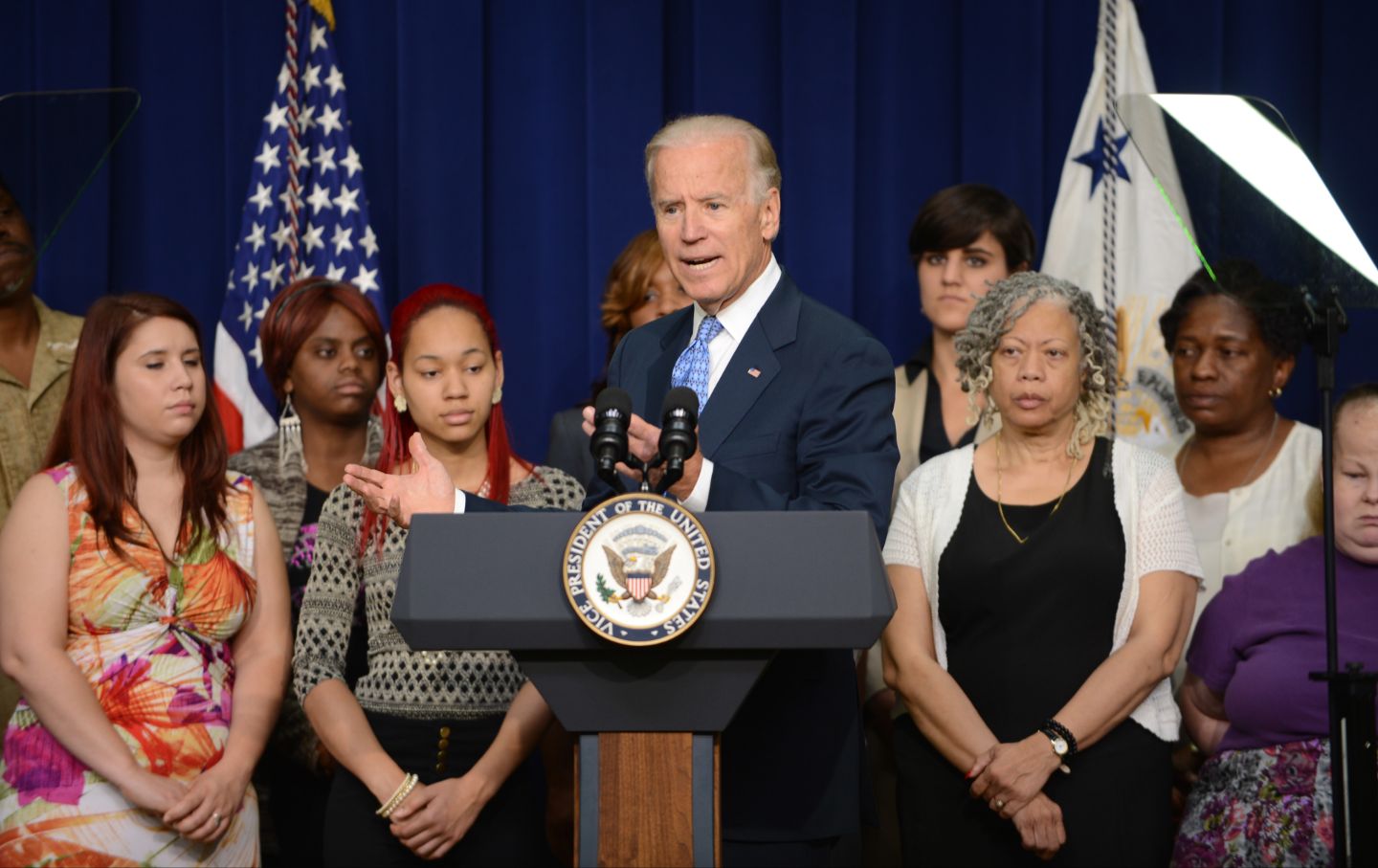Why We Need a “Doug Jones” More Than a Dow Jones
On the Magnificent Seven and market myths.

The S&P 500 rose to new heights last week on the strength of the Magnificent Seven. No, that’s not the title of a new remake of a remake of a Spaghetti Western film. It’s the name coined by Bank of America analyst Michael Hartnett to label the seven tech companies—Apple, Amazon, Alphabet, Meta, Microsoft, Nvidia, and Tesla—that make up over a quarter of the stock market’s total value, and that added a collective $5.1 trillion to the market last year.
In other words: The companies that were already making a lot of money are now making even more. For the average working American, the market’s ups and downs have little or no correlation to their lives—but they think it does, thanks in no small part to close and continuous media coverage.
Nearly 40 percent of Americans have no financial stake in the stock market. Among those households who do, most have only indirect investments through index funds and 401(k)s, which amount to a tiny slice of the total pie. And even for those with direct stockholdings, the average value of their investments is around $15,000—for comparison, the average American owes about $60,000 in debt.
The inequity doesn’t stop there. Americans with postgraduate degrees are twice as likely to hold stocks as high school grads. White Americans own a staggering 89 percent of stocks. And to echo a senator from Vermont, the wealthiest 1 percent now own more than half of all US stocks—a fact that both illustrates and perpetuates the gross wealth disparity in this country. A “bull” market, indeed.
Adding insult to injury, the value of the stock market sometimes reflects the exact inverse of the worker’s experience. Wins for labor, like unionization and wage growth, often sink stock values. The same goes for antitrust measures that keep prices competitive and hold companies accountable to consumers. After a judge blocked Spirit Airlines’ merger with JetBlue, the carrier’s shares dropped 20 percent. On the flip side, when the pandemic shuttered businesses and sent unemployment skyrocketing, the S&P 500 saw its best month of trading in 33 years.
And yet, thanks to the tenor of today’s stock market coverage, consumers still tend to conflate the market with the economy overall. The media—its members perhaps over-indexing on their own status in the stockholding elite—has perpetuated this fallacy. Share prices scroll endlessly on the nightly news, while analysts devote entire shows to evaluating stocks as though they were NBA draft prospects. But the truth is, Jim Cramer’s antics on Mad Money are at best irrelevant and at worst insulting to the millions of Americans who don’t have the money to spend on theatrical stock picks, and don’t have the time to watch a show that airs on their way home from work.
It’s past time to refocus our national attention from the fortunes of the 500 to the concerns of countless families living paycheck to paycheck.
Over 30 years ago, the firebrand progressive thinker and beloved Nation contributor Jim Hightower proposed replacing the Dow Jones Industrial Average with a better economic bellwether: the Doug Jones. (No relation to the former Alabama senator, though he certainly deserves economic prosperity.)
Jim’s tongue-in-cheek ticker tape recorded the fortunes of Doug Jones, the archetypical American worker: his job prospects threatened by factory closures, his grocery bill squeezed by inflation, his bank account burdened by high interest rates. It was, as Jim put it, “a real-life measure of ‘how ya doin’?”
Decades later, it’s more important than ever. Breathless coverage of the Magnificent Seven’s record-breaking growth stands in stark contrast to the ongoing economic pessimism of many Americans. The result is a sense of whiplash.
With voters thinking of their pocketbooks as they head to the polls this year, President Biden must sell his administration’s economic wins in terms that square with people’s experiences—by addressing the state of the Doug Jones. To his credit, he has already made real economic indicators a core part of his reelection message, touting low unemployment and slowing inflation. But Biden can do more both to take credit for his successes, including recent consumer protection victories, and to take ownership of issues like wage stagnation.
The media, too, has an important role to play in telling the story of everyday Americans’ economic reality. The tactics used to tout minute-by-minute stock performance would be better spent broadcasting the line items that show up in people’s budgets and bank accounts.
How about showing a live ticker tracking real wages? Or announcing a drop in egg prices with the same fanfare as a spike in Microsoft shares? Robert Reich could take over for Jim Cramer, smashing a celebratory buzzer every time another Starbucks unionizes.
And most importantly, for every report on how much growth we’re seeing, let’s examine who profits from that growth. An economy where everyone benefits—there’s nothing more magnificent than that.
More from The Nation

Why Bidenomics Was Such a Bust Why Bidenomics Was Such a Bust
A large majority of voters gave the Biden administration a failing grade on the economy. For the sake of future policy battles, it is worthwhile to try to understand their reasons...

Hickey Freeman's Next Chapter Hickey Freeman's Next Chapter
This factory in upstate New York is a testament to the lasting legacy and future of the modern labor movement.

If You Don’t Know Who Ken Griffin Is, You Should If You Don’t Know Who Ken Griffin Is, You Should
How the press keeps us in the dark about the new Gilded Age.

Millions of Workers Are Due More Overtime Pay. Will They Get It? Millions of Workers Are Due More Overtime Pay. Will They Get It?
New regulations are designed to expand the number of employees entitled to overtime. But the conservative courts have other ideas.

Ballet Dancers’ Next Move: Union Organizing Ballet Dancers’ Next Move: Union Organizing
Contract negotiations have brought higher pensions, mandated rest times, and increased wages for a job that requires intense schedules and years of training.

How Can We Wean Ourselves Off Our Country’s Military Dependency? How Can We Wean Ourselves Off Our Country’s Military Dependency?
Moving resources and skills and jobs from the military-industrial complex to civilian sectors is a big project. But it could start in your own community.


